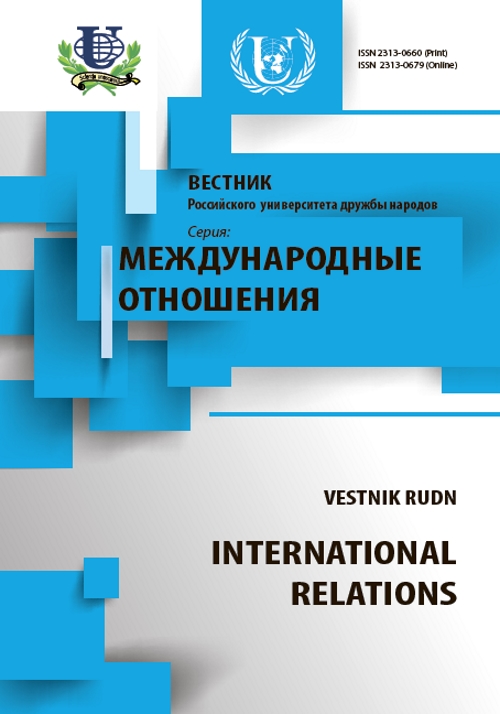No 2 (2012)
- Year: 2012
- Articles: 13
- URL: https://journals.rudn.ru/international-relations/issue/view/651
Articles
United States Science Policy: from Conceptions to Practice
Abstract
The authors analyze the organizational structure of the U.S. scientific community, examining the V. Bush report Science: the Endless Frontier (1945) as its conceptual basis, which remains the cornerstone of the American science policy. The authors point out decentralization as the key trait of this structure, which reveals itself in the absence of a unitary centre with a mission to formulate and implement science policy and high level of dissemination of self-government practices supported by a wide range of government agencies. This configuration determines the special position, occupied by the universities as universal research establishments possessing flexibility in cooperation with state agencies and private sector.
Vestnik RUDN. International Relations. 2012;(2):5-12
 5-12
5-12


Peculiarities of Modern Foreign Policy of Iran
Abstract
The article is focuses on the analysis of the main peculiarities of modern foreign policy of iranian President M. Ahmadinejad, his constructive interaction concept in foreign policy. The formation of the nuclear gate for entering into world policy and basic problems of Iranian development as a new regional leader in the context of globalization and international relations transformation process are considered.
Vestnik RUDN. International Relations. 2012;(2):13-20
 13-20
13-20


«Soft Power» as a Form of Indirect Application of «National Interest»
Abstract
The article provides the information on American «soft power» that promotes U.S. national interests worldwide. There is an analysis of the evolution of «national interest» and new forms of U.S. influence on the world order. According to the authors' opinion, the importance of «soft power» issues in foreign policy strategies of the countries will be growing further due to overwhelming interdependence.
Vestnik RUDN. International Relations. 2012;(2):21-30
 21-30
21-30


 31-37
31-37


Cross-Border Regional Unions in Modern Europe
Abstract
The article focuses on analyses of establishing and specific activities of cross-border regional unions, which become typical for the European Union. Contemporary cooperation on the basis of such units is becoming normal and widespread practice as for the states of the European Union and neighboring states as well, Russia for example.
Vestnik RUDN. International Relations. 2012;(2):38-44
 38-44
38-44


Cooperation between Russia and Vietnam in Oil and Gaz Industry
Abstract
The article deals with the problems and prospects of Russian-Vietnamese strategic partnership in the oil and gas industry as an example a 30-year practice of «Vietsovpetro». Exploration and production of oil and gas remains to be the most important part of economic and trade relations between two countries. Signed agreement extends the activities of «Vietsovpetro» until 2030, and projects of Russian companies Lukoil, Gazprom and TNK-BP suggests that Russia has managed to interest the Vietnamese side to continue the mutually beneficial cooperation. However, current international realities require the ongoing development of promising new projects, including investment.
Vestnik RUDN. International Relations. 2012;(2):45-50
 45-50
45-50


Joint Exploration of the Arctic in the Improving of Economic Relations between Russia and the USA
Abstract
The article is devoted to the Arctic in the historical retrospective, as well as the discovering of the potential to improve the relationship between modern Russia and the USA on the example of joint exploration of the Arctic shelf. This theme is particularly relevant in the present period of development of Russian-American relations and the modernization of Russia's economy.
Vestnik RUDN. International Relations. 2012;(2):51-59
 51-59
51-59


Anglo-Russian Rivalry in Persia in Russian Social and Political Essays of 1900-1940s
Abstract
The article is devoted to the comparative analysis of different aspects of Anglo-Russian rivalry in Persia and relations between Russia and Persia based on study of social and political essays printed in Russia and the USSR in 1900-1940s.
Vestnik RUDN. International Relations. 2012;(2):60-67
 60-67
60-67


The Role of Italian Cultural Policy in Image Formation Abroad
Abstract
The article focuses on analyses of the Italian cultural policy and its influence on country's image abroad. The author examines the peculiarities of Italian cultural policy, which determine the image of the country in Russia and other European states.
Vestnik RUDN. International Relations. 2012;(2):68-74
 68-74
68-74


Relations between Russia and Brazil in BRICS from the Russian and Brazilian Researchers Point of View
Abstract
This article analyzes conceptions of Russian and foreign researches towards the relations between the participating countries of BRICS, in particular, Russia and Brazil. It focuses on the advantages of the new association and its prospects in the future.
Vestnik RUDN. International Relations. 2012;(2):75-80
 75-80
75-80


Historical Preconditions and Factors for Development of International Relations between UAE and African Countries
Abstract
The article focuses on analyses of preconditions for development of international relations between UAE and African countries including geographical location of the UAE, naval and ship building skills of the Persian gulf Arabs, participation of both Eastern Africa and Persian Gulf in the Indian ocean trade as well as influence on its development of external factors such as Islamic expansion and colonial policies of Britain and Portugal.
Vestnik RUDN. International Relations. 2012;(2):81-88
 81-88
81-88


The Struggle for the Flexible Response Embracement by NATO and its Influence on the Alliance (1961-1969)
Abstract
The article is devoted to the studying of the process related to the implementation of the flexible response doctrine in NATO. The author analyses key factors that led to the new doctrine appearance and the U.S., U.K., French and West German attitude to it.
Vestnik RUDN. International Relations. 2012;(2):89-96
 89-96
89-96


The Authors
Vestnik RUDN. International Relations. 2012;(2):97-98
 97-98
97-98











